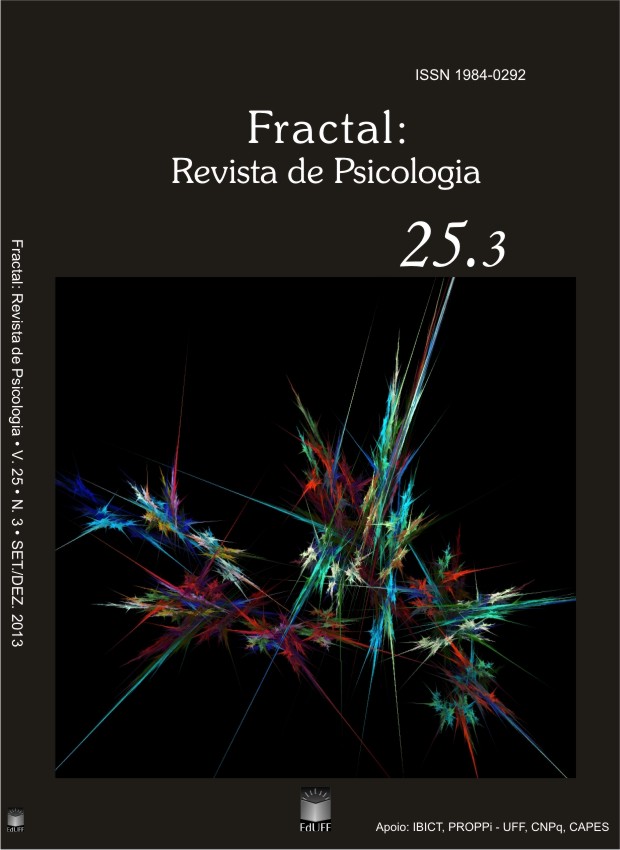Feminilidade: um detalhe
Palavras-chave:
Feminilidade, detalhe, contingência, roupa, objeto a.Resumo
O presente texto pretende abordar a questão da feminilidade em relação ao tema das roupas. Freud havia concluído que a mulher “trançava e tecia” para encobrir a falta fálica e Lacan no rememorou com seu texto, que a mulher se portava como uma “autêntica tecelã” nos rearranjos pulsionais que empreendia em sua vida anímica. Partimos de alguns autores da literatura para demonstrar que a tese freudiana e lacaniana somente corroboram com a hipótese de que há uma relação intrincada entre mulheres e roupas, melhor dizendo: entre a feminilidade e a “função do véu”. Entretanto, o feminino lança mão do véu que são as roupas, segundo a psicanálise, para encobrir uma suposta falta da mulher. Nesse sentido a roupa é uma saída fálica que encobriria a castração. O texto aponta então uma via de apreensão do feminino pelo tema do detalhe, pois as qualidades desse objeto ínfimo e sutil apresentam uma saída pelo estilo próprio e feminino de cada uma das mulheres. Ou seja, se a roupa apresenta uma saída pela via do falo, o detalhe marca o todo com um corte e reabre a questão da mulher com a própria falta.Downloads
Referências
BAUDELAIRE, C. Sobre a modernidade: o pintor da vida moderna. Rio de Janeiro: Paz e Terra, 1996.
BAUDELAIRE, C. O pintor da vida moderna. Belo Horizonte: Autêntica, 2010.
BALZAC, H. Estudos de Mulher. Porto Alegre: L&PM, 2006.
BARTHES, R. Sistema da Moda. São Paulo: Nacional, 1979.
BARTHES, R. Fragmentos de um discurso amoroso. São Paulo: Martins Fontes, 1994.
BARTHES, R. Imagem e Moda. São Paulo: Martins Fontes, 2005.
FREUD, S. O Moisés de Michelangelo (1914). In: ______. Obras psicológicas completas de Sigmund Freud. Rio de Janeiro: Imago, 1976. Edição Standard Brasileira.
FREUD, S. Feminilidade (1933). In: ______. Obras psicológicas completas de Sigmund Freud. Rio de Janeiro: Imago, 1976. Edição Standard Brasileira.
FREUD, S. Análise leiga (1926). In: ______. Obras psicológicas completas de Sigmund Freud. Rio de Janeiro: Imago, 1976. Edição Standard Brasileira.
FREUD, S. Sobre o narcisismo: uma introdução (1914). In: ______. Obras psicológicas completas de Sigmund Freud. Rio de Janeiro: Imago, 1976. Edição Standard Brasileira.
FLAUBERT, G. Três contos. São Paulo: Cosac Naify, 2004.
LACAN, J O seminário: mais ainda (1972). Rio de Janeiro: J. Zahar, 1985. Livro 20.
LACAN, J O seminário: a ética da psicanálise (1959). Rio de Janeiro: J. Zahar, 1991. Livro 7.
LACAN, J O seminário: os quatro conceitos fundamentais da psicanálise (1964). Rio de Janeiro: J. Zahar, 1998. Livro 11.
LACAN, J Escritos (1966). Rio de Janeiro: J. Zahar, 1998.
LACAN, J. O seminário: a angústia (1962). Rio de Janeiro: J. Zahar, 2005. Livro 10.
MILLER, J. Os divinos detalhes. Buenos Aires: Paidós, 1989.
PROUST, M. Em busca do tempo perdido: a sombra das raparigas em flor. São Paulo: Globo, 2006.
STALLYBRAS, P. O casaco de Marx. Belo Horizonte: Autêntica, 1999.
TEIXEIRA, A. A soberania do inútil. São Paulo: Annablume, 2007.
Downloads
Publicado
Edição
Seção
Licença
Autores que publicam nesta revista concordam com os seguintes termos:
- Autores mantém os direitos autorais e concedem à revista o direito de primeira publicação, com o trabalho simultaneamente licenciado sob a Creative Commons Attribution License que permitindo o compartilhamento do trabalho com reconhecimento da autoria do trabalho e publicação inicial nesta revista.
- Autores têm autorização para assumir contratos adicionais separadamente, para distribuição não-exclusiva da versão do trabalho publicada nesta revista (ex.: publicar em repositório institucional ou como capítulo de livro), com reconhecimento de autoria e publicação inicial nesta revista.

This work is licensed under a Creative Commons Attribution 4.0 International License.

Na medida do possível segundo a lei, a Fractal: Revista de Psicologia renunciou a todos os direitos autorais e direitos conexos às Listas de referência em artigos de pesquisa. Este trabalho é publicado em: Brasil.
To the extent possible under law, Fractal: Revista de Psicologia has waived all copyright and related or neighboring rights to Reference lists in research articles. This work is published from: Brasil.



